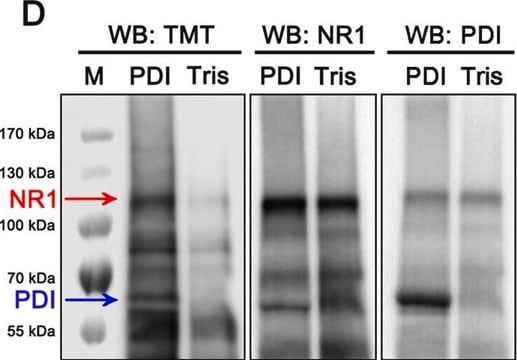AB5482
Anti-Superoxide Dismutase 1 Antibody
serum, Chemicon®
Synonym(s):
SOD1
Sign Into View Organizational & Contract Pricing
All Photos(1)
About This Item
UNSPSC Code:
12352203
eCl@ss:
32160702
NACRES:
NA.41
Recommended Products
biological source
rabbit
Quality Level
antibody form
serum
antibody product type
primary antibodies
clone
polyclonal
species reactivity
rat, mouse
should not react with
human
manufacturer/tradename
Chemicon®
technique(s)
western blot: suitable
NCBI accession no.
UniProt accession no.
shipped in
dry ice
target post-translational modification
unmodified
Gene Information
human ... SOD1(6647)
General description
Mutations in the copper/ zinc superoxide dismutase (SOD1) gene are associated with 15- 20% of the familial forms of motoneuron disease. This 153 amino acid metalloenzyme is expressed in virtually all cells of all organisms above bacteria and is highly conserved across species, although some minor variations do occur. The incorporation of the mutated form of the SOD1 human gene into a transgenic mouse leads to the onset of the disease that closely resembles the human condition. These animals become weak at about 2-4 months of age and rapidly lose function, which results in death 4- 6 weeks later.
Specificity
Superoxide Dismutase 1 (SOD1), mouse and rat specific. No reactivity with human SOD1
Immunogen
Synthetic peptide corresponding to amino acids 25-37 of mouse SOD1.
Application
Detect Superoxide Dismutase 1 using this Anti-Superoxide Dismutase 1 Antibody validated for use in WB.
Research Category
Neuroscience
Neuroscience
Research Sub Category
Oxidative Stress
Oxidative Stress
Western blotting: 1:200-1:500 (see images)
Optimal working dilutions must be determined by end user.
Optimal working dilutions must be determined by end user.
Physical form
Rabbit serum. Lyophilized. Contains no preservative. Reconstitute with 50 μL of sterile water.
Storage and Stability
Maintain lyophilized material at -70°C (dry) for up to 12 months after date of receipt. After reconstitution maintain frozen at -20°C in undiluted aliquots for up to 6 months. Avoid repeated freeze/thaw cycles. Glycerol (1:1) can be added for additional stability.
Legal Information
CHEMICON is a registered trademark of Merck KGaA, Darmstadt, Germany
Disclaimer
Unless otherwise stated in our catalog or other company documentation accompanying the product(s), our products are intended for research use only and are not to be used for any other purpose, which includes but is not limited to, unauthorized commercial uses, in vitro diagnostic uses, ex vivo or in vivo therapeutic uses or any type of consumption or application to humans or animals.
Not finding the right product?
Try our Product Selector Tool.
Storage Class Code
11 - Combustible Solids
WGK
WGK 1
Flash Point(F)
Not applicable
Flash Point(C)
Not applicable
Certificates of Analysis (COA)
Search for Certificates of Analysis (COA) by entering the products Lot/Batch Number. Lot and Batch Numbers can be found on a product’s label following the words ‘Lot’ or ‘Batch’.
Already Own This Product?
Find documentation for the products that you have recently purchased in the Document Library.
Elaine L Bearer et al.
Neurobiology of aging, 70, 276-290 (2018-07-29)
Alzheimer's disease (AD) is a disease of aging that results in cognitive impairment, dementia, and death. Pathognomonic features of AD are amyloid plaques composed of proteolytic fragments of the amyloid precursor protein (APP) and neurofibrillary tangles composed of hyperphosphorylated tau
Nerve terminal degeneration is independent of muscle fiber genotype in SOD1 mice.
Carrasco, DI; Bichler, EK; Seburn, KL; Pinter, MJ
Testing null
Christopher S Medina et al.
Frontiers in cellular neuroscience, 13, 501-501 (2019-12-19)
Amyloid precursor protein (APP) is the precursor to Aβ plaques. The cytoplasmic domain of APP mediates attachment of vesicles to molecular motors for axonal transport. In APP-KO mice, transport of Mn2+ is decreased. In old transgenic mice expressing mutated human
Qian Wang et al.
PloS one, 7(5), e36818-e36818 (2012-05-19)
Hepatitis B virus (HBV) is a major etiological factor of hepatocellular carcinoma (HCC). However, the precise pathogenetic mechanisms linking HBV infection and HCC remain uncertain. It has been reported that decreased antioxidant enzyme activities are associated with severe liver injury
Our team of scientists has experience in all areas of research including Life Science, Material Science, Chemical Synthesis, Chromatography, Analytical and many others.
Contact Technical Service








